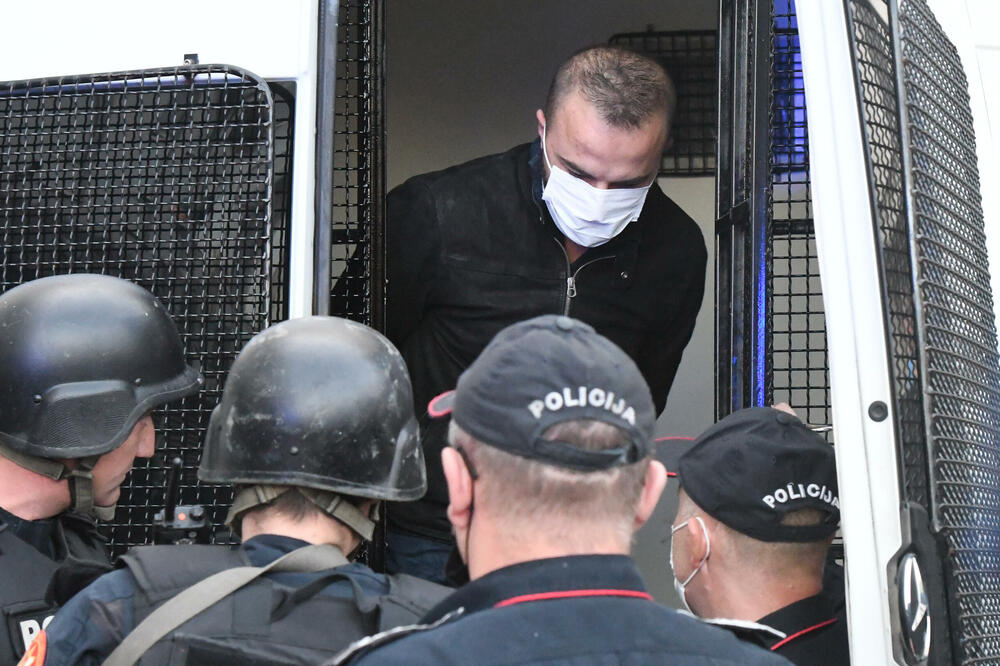The accused Ilir Đokaj he was sentenced yesterday to a single long-term prison term of 40 years for murdering his unmarried wife out of base motives Sheila Bakija (19), wounding her father Shabana and illegal possession of weapons, on Karabuško polje in Tuzi on September 30, 2021.
The first-instance verdict in the Podgorica High Court was pronounced by the president of the council of judges Veljko Radovanović.
The judge said that the court undoubtedly, based on the presented evidence, the defense of the defendants, the statements of witnesses and material evidence, found that the defendant deliberately, out of base motives and feelings of selfishness, killed Sheila, who refused to renew the love relationship with him.
"After the conversation and after Šeila told Đokaj that she did not want to renew the relationship and that she did not love him, he fired five shots from the gun, inflicting serious injuries on her, as a result of which she died."
In the explanation of the verdict, Radovanović said, among other things, that all legal conditions were met for the defendant to have committed a criminal offense - aggravated murder, that is, that he killed Šejla Bakija out of low offers and feelings of selfishness.
The judge referred to the expert's report, which states, among other things, that the criminal offense results from characterological manifestations of personality disorders in the form of narcissism, obsessiveness, overestimated jealousy on a neurotic level, with a subjective experience of possessing the injured party.
The judge said that the court accepted the legal qualification of the indictment.
"The defendant Đokaj came to Saban Bakija's house armed. During the court proceedings, the court did not establish that Đokaj's life was threatened in any way. The court did not accept the defendant Ilir Đokaj's defense that he felt threatened by Šaban Bakija and that he was holding onto his belt with his hand. Because if that were the case, the defendant would have fired shots at the one from whom he was threatened," said the judge.
In the indictment of the Higher State Prosecutor's Office, it is written that on September 30, 2021, Đokaj premeditatedly took the life of Šejla, out of low motives, and then premeditatedly tried to take the life of her father.
"In the way that on the terrace of the injured party's family home, out of reckless selfishness and a sense of possessiveness, the injured Šeila, who refused to renew the extramarital union with the defendant that had been broken off a few months earlier, during which time the defendant pursued the injured party directly and by phone, informing her that between them it is not over that her life is in his hands, from a pistol of an unknown brand, caliber 7,65 millimeters, which he held and carried in a public place without authorization and for which he did not have a firearms certificate, after the conversation during which the injured B. Š. repeated her will that she did not want to renew her union with him and that she did not love him, in the presence of the victim's father, fired five projectiles in the direction of Baki Šeila, which hit her in the area of the chest, left arm and left leg, from which projectiles she sustained injuries serious and life-threatening injuries, which resulted in death on the same day".
It is added that after that, and at the moment when the victim Bakija Šaban approached him in an attempt to grab his hand, the defendant turned the gun towards the victim and fired one projectile in the direction of the chest of the victim, which hit him, after which he moved away towards to your Audi vehicle...
"That, after the victim Šaban went after him, the defendant, again, fired two projectiles, one of which hit the victim in the abdomen and left leg, while the other projectile hit a pillar on the terrace of the house, during which the victim received a particularly serious and life-threatening bodily injury in the form of a gunshot wound to the chest, a gunshot wound to the abdomen and a gunshot wound to the left leg," the indictment states.
Lješković: The verdict was passed on the basis of pressure from politicians and the NGO sector
Lawyer Srđan Lješković, the defense attorney of the defendant Ilir Đokaj, told reporters after the court handed down the verdict, that the verdict was brought under pressure, and that the courts pass such verdicts of 40 years in prison lightly. He pointed out that no defense evidence was presented in this proceeding.
"In the explanation of the verdict, it was said that all the evidence was presented. I now publicly ask the question: what evidence is that? Evidence proposed by the prosecution and non-governmental organizations. This judgment was made due to pressure. Let me take you back to the beginning of this trial: to Mrs. Oana Kristina Popa, to Zdravko Krivokapić, Dritan Abazović, the president of the municipality of Tuzi, all the NGOs in Montenegro that exerted pressure on the court. I believe that this verdict was passed through pressure to impose a sentence of 40 years in prison," Lješković pointed out.
He added that the court rejected all the evidentiary proposals of the defense.
"Of course the defense will file an appeal, especially since every one of our requests for evidence has been denied. I think that the evidence we proposed, if we had presented it, it is certain that the verdict would have been completely different", concluded lawyer Lješković. He added that the court only presented evidence that supports the indictment.
"While the defense was not given a chance to present any evidence. Fashion is about murder or negligence or on the spur of the moment, and I certainly claim that it is not a murder for low motives", said Lješković.
Bonus video:




